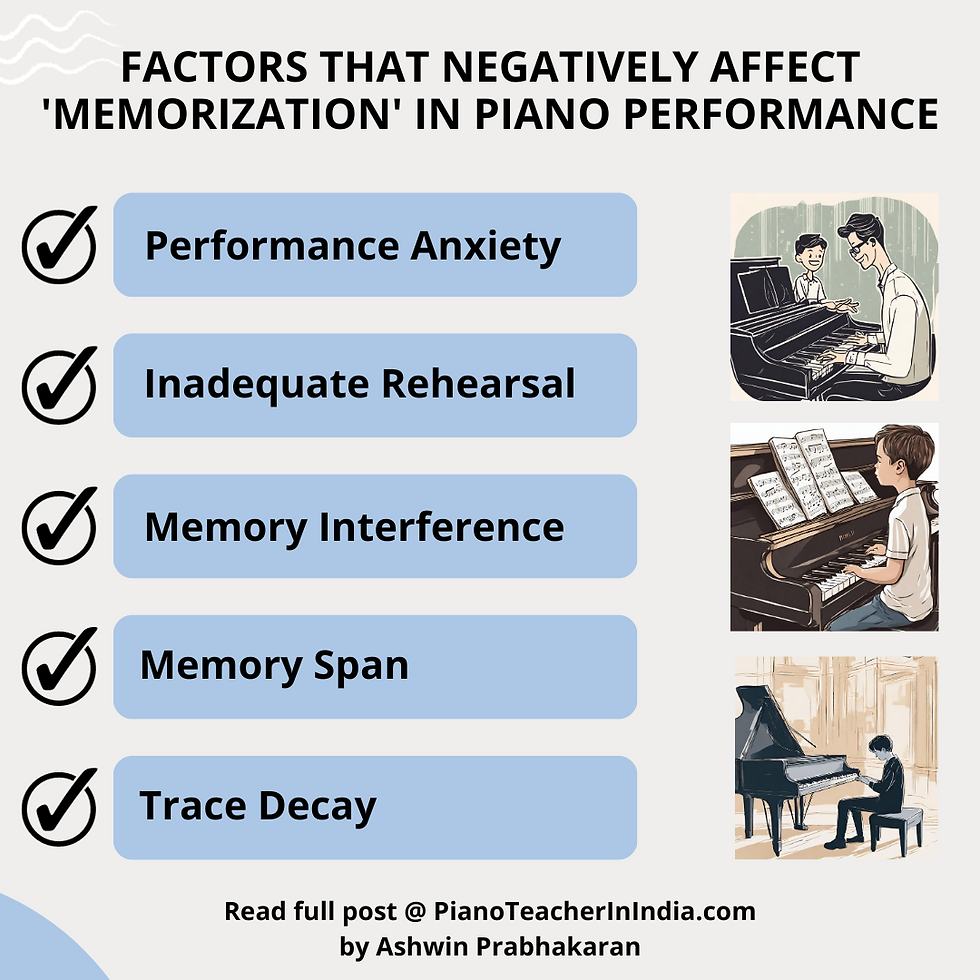Factors that Negatively affect 'Memorization' in Piano Performance
- Ashwin Prabhakaran
- Nov 21, 2023
- 3 min read

It is the Winter Exam Season for Music Boards here in India. Which implies that for the most part, students are working on Memorizing and Polishing their pieces and improving their Technical, Aural, Sight Reading and Theoretical Skills at this point of time.
While Memorizing music is not necessarily expected (and some teachers even discourage their students from Memorizing), personally speaking, I encourage and push my students to Memorize their Performance Pieces (I am fine with them having the score open to help with Recall Cues).
In my opinion, Memorization allows for more fluid and imaginative performances.
Also, I have observed that students who memorize right from the early stages, have greater capacity to optimally learn and perform larger works when they get to Advanced Music (as compared with students who are always dependent on the Score) because they have developed a larger library of Organized Ideas that they concurrently categorize they music they keep learning!!!
Anyways, the topic at hand is about Factors that disrupt Memory in the context of Piano Performance
1. Performance Anxiety: Anxiety and Stage Fright can significantly disrupt a pianist's memory during a performance. Nervousness can lead to cognitive impairments, affecting the ability to recall memorized pieces. This is something teachers need to factor in as they help students prepare music
2. Inadequate Rehearsal: Insufficient or ineffective rehearsal of a piece can result in gaps in memory and difficulties in recalling specific passages or sections of music during a performance. Teachers need to be mindful of giving students enough experiences to perform the music in front of new faces to help them factor in that experience into their practices
3. Memory Interference: Interference refers to the phenomenon where the process of remembering or recalling information is disrupted by the presence of other information.
Imagine being introduced to two individuals - Ram Sharma and Ravi Shastri, and later meeting two other individuals - Rajat Sharma and Ramesh Shah. The similarities of all these names make it difficult to remember each person's names.
However, contrasting names such as Ramesh Tiwari, Amit Kapoor, Sriram Kumar and Karan Mehra are easier to remember in one go.
The same concept applies to remembering music. Memorizing music is easier when the student is memorising sections that are significantly different from each other. For eg, a passage with Melody-Accompaniment is memorized alongside a Chordal passage would be easier to remember than two passages of same texture.
4. Memory Span: Memory Span refers to the number of items an individual can retain and recall in correct order, can indeed affect the memorization of piano pieces. The ability to remember and perform complex musical compositions from memory relies heavily on a pianist's working memory and overall memory capacity.
Here's how memory span can impact the memorization of piano pieces:
(i). Length and Complexity of Pieces: Individuals with a larger memory span may be able to memorize longer and more intricate compositions, while those with a smaller memory span may find it challenging to retain extensive musical material.
(ii). Recall of Musical Structures: Memory span can affect a pianist's ability to recall the musical structures, such as themes, motifs, chord progressions, and variations, within a piece.
(iii). Chunking and Segmentation: A larger memory span may enable the pianist to effectively organize and retain larger musical segments, facilitating the memorization process.
(iv). Mental Rehearsal: Those with a larger memory span may find it easier to mentally rehearse and retain musical material.
(v). Performance Confidence: Individuals with a larger memory span may feel more secure in their ability to recall and execute complex pieces without relying on sheet music.
5. Trace Decay: Trace Decay suggests that memories fade or decay over time if they are not used or reinforced, may have implications for the memorization of piano pieces. Here's how trace decay could potentially impact the memorization of piano pieces:
(i) Long-Term Retention: Memories that are not periodically activated or reinforced may gradually fade.
(ii) Maintenance Rehearsal: Through consistent practice, pianists may be able to prevent or slow down the decay of musical memories.
(iii) Recall Accuracy: If trace decay were to impact the memory of piano pieces, it might lead to decreased accuracy in recall, particularly for details such as specific notes, dynamics, and nuances within the music.
(iv) Contextual Factors: The acoustic environment, emotional state, and physical setting during practice and performance affects the persistence of the memory trace.
(v) Retrieval Cues: Memories may be more vulnerable to decay in the absence of retrieval cues. In the context of piano performance, the availability of effective retrieval cues, such as kinesthetic sensations, visual imagery, and emotional connections to the music, is necessary to counteract potential effects of trace decay on memory retention.
Conclusion
Understanding the above factors can help Students and Teachers to develop Practice Strategies that will aid in enhancing memory - such as employing effective study techniques, managing stress, ensuring adequate rest, and creating optimal learning environments.


.jpeg)

Comments